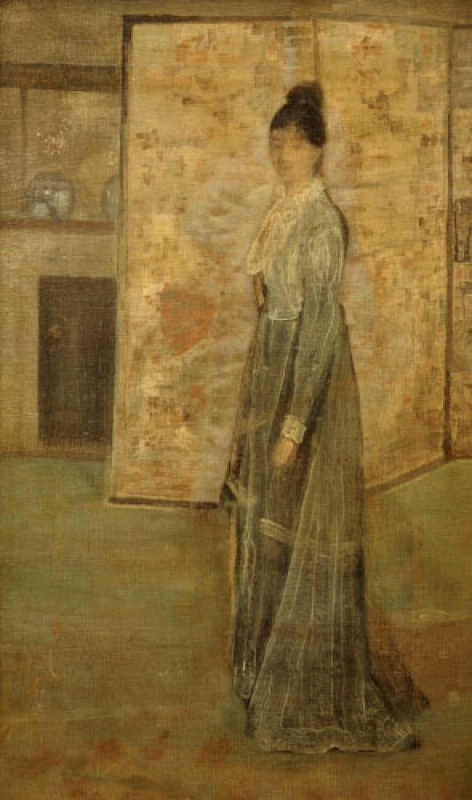Titles
There are a few variations in title and punctuation, as follows:
- 'Arrangement in Flesh-colour and Grey – The Chinese Screen' (1910?, Joseph Pennell). 1
- 'The Chinese Screen; an arrangement in Flesh-colour and grey' (1917, Christie's). 2
- 'Lady in a White Dress' (1959, Leicester Galleries). 3
- 'Arrangement in Flesh Colour and Grey: The Chinese Screen' (1980, YMSM). 4
'Arrangement in Flesh Colour and Grey: The Chinese Screen' is the preferred title, although it was not invented by Whistler.
Description
A full-length portrait study, in small vertical format, showing a woman in an interior. The woman is standing, her body facing left, but looking at the viewer; she has dark hair arranged in a bun high on her head; she wears a grey dress with a white bodice, with either a fichu or cream ruffles at the front, and narrow sleeves also trimmed with off-white at the wrist. Behind her is a folding screen decorated with unidentifiable shapes in many colours including pale blue, cream, pale brown and orange. Behind and to left of the screen is a white fireplace, with roundels at the upper corners, the grate dark. Sprays of blossoms stand in round glass bowls on the mantelpiece in front of a mirror. There are numerous marks of rubbing out and alterations all over the canvas.
Site
The scene slightly resembles the front room in Whistler's house at Lindsey Row, Chelsea, but could well be similar to that in neighbouring houses.
Sitter
Unknown.
Comments
There have been questions about the authorship of this painting.
In 1910, Elizabeth Robins Pennell (1855-1936) at first accepted the authenticity of this painting, but her husband, Joseph Pennell (1860-1926) apparently questioned it, and elicited from Walter Dowdeswell (1858-1929) that the screen had been partly repainted recently. 5
It appears that these doubts came to be shared by the London art dealer Walter Dowdeswell (1858-1929), and the painting was sold as by Walter Greaves (1846-1930) at Christie's in London on 9 February 1917 (lot 309) with the title 'The Chinese Screen; an arrangement in Flesh-colour and grey' .
It is possible that it was inspired by Whistler but painted by Walter Greaves, since as it stands there is nothing in the visible technique and brushwork that suggests Whistler's work. But it is also possible that it was based on, or painted over, a portrait by Whistler.
Denys Sutton (1917-1991) thought, like Joseph Pennell, that it was 'a border-line case' as a painting by Whistler. 6
Notes:
1: Inscribed on a photograph in the Library of Congress, E. R. and J. Pennell Collection.
2: Christie's, London, 9 February 1917 (lot 309) as by W. Greaves.
3: Oliver F. Brown to A. McL. Young, 30 November 1959, GUL WPP files.
4: YMSM 1980 [more] (cat. no. 51).
5: Pennell 1921C [more] , pp. 125-27.
6: Sutton, Denys, 'A Whistler Exhibition', Burlington Magazine, vol. 102, October 1960, pp. 460-61, at p. 460.
Last updated: 4th June 2020 by Margaret






